TRAVERTINE DECKING, PATIOS & PAVERS
Our travertine pool and patio service includes a travertine penetrating sealer developed by Tom. The sealer’s durability is far superior to other sealers on the market.
Insured
Our travertine pool and patio service includes a travertine penetrating sealer developed by Tom. The sealer’s durability is far superior to other sealers on the market.
Experience and Passion
“We Noticed That Some Of Our Travertine In Our Backyard Was Beginning To Erode. Wanting To Protect Our Investment We Researched Companies That Cleaned, Sealed, And Protected Natural Stone. Our Finished Product Is Beyond Our Expectations! The Process Truly Brought Out The Colors And The Beauty In Our Stone. We Are Extremely Pleased And Will Only Use Your Services In The Future. Thank You!”
From TC in Scottsdale, June 23, 2019
Travertine patio pavers are another perfect example of an industry so full of misinformation. Customers are often confused about whether to seal or not and what sealer to use. Currently, many industry professionals claim travertine pavers last forever and do not need to be sealed. This is false! I was one of the first travertine restoration contractors to say travertine floors inside do not need to be sealed, but it’s still common that the industry says the contrary.
Travertine pavers outside is another story… One of the main reasons travertine installers and contractors say not to seal your travertine patio pavers is that topcoat sealersDesigned to lay on top of the stone and change appearance ranging from a low to high shine. Prevents liquids from soaking into the stone. This type of sealer is prone to scratching, dulling and peeling. Regular maintenance is required to keep the sealer intact and looking good. More are overused and can cause more problems in the future. True. Another reason it is said that sealers should not be used outside is because the use of a proper penetrating sealer has little to no ability to actually protect the stone by itself — even the most expensive solvent based enhancing penetrating sealers.
After years of having the very best raw materials for solvent based enhancing penetrating sealers blended for me. After using them and seeing their shortcomings, I developed a different type of penetrating sealer and a complete system for addressing all of the issues with travertine pool patio pavers.
We can help to protect your investment as well as teach you the truth about an industry that is full of misinformation and deceptive sealing practices.
We have developed patio sealing and finishing systems that are far superior to any that our competitors use. We have proved it with tens of thousands of square feet of all types natural stone patios in our Arizona market. We offer a lifetime guarantee the sealer will never cause a problem. This is different than a lot of the false performance warranties promised in the industry.
When your travertine is new and healthy (just like teeth…) it is the optimal time to protect your investment for years of use. Sadly, any patio can hit a tipping point where restoration is no longer an option. Don’t let your patio fall to the jack hammer! Arizonian’s love their outdoor living. Let us take the guesswork out of properly caring for your travertine patio—so you can sit back and live it up in your outdoor oasis.
Sometimes the term “honing” is used in this industry. This term is improperly used and we do not “hone,” what we do is much better and safer. The grit level of abrasives we will use vary depending on the stone and its density. Abrasives are very important part of the process of protecting the patio and must be used properly.
SCIENCE NOTE… If you imagine the surface of the stone under a microscope it looks like a lot of the little trees. The larger amount of this crystalline tree, the more water has the ability into get to them, break them down and cause the lime reaction to start. Also, porosity can be increased by the surface area of the stone. When we safely remove the surface texture, we are removing surface area. The less surface area, the less porous it is, which is a good thing!
Polishing is the best way to protect the stone. Main factors are the quality of the travertine and who is using the patio around water. Small children and people who cannot risk a fall need to be considered. Polish may not be the best choice for their situation. We recommend doing a slip test with bare feet so the customer can see for themselves how their stones perform and make a choice. We cannot and do not accept any liability once we have worked on the patio for slip level or any falls that may occur.
Our custom polishing system is the best way to protect the patio because we are able to reduce the porosity as much as possible. The smoother the travertine surface, the shinier it gets. The shinier it gets, the fewer pores it has on the service for water to soak in and cause the breakdown and lime to occur.
The chemical benefit is also an important factor to consider we are actually able to rearrange the molecules in the surface of the stone to be more in line and to protect themselves. Calcium carbonate is a compound that has shape. If you imagine a pile of spoons each one is the calcium carbonate molecule. In a pile, their handles are exposed and you could reach in and break one.
One important consideration is the stone will more slippery when shiny. All Travertine patios can be slippery when wet, regardless of shine level, depending on several factors. Generally, there’s not much more slip when polished. This is something each customer needs to address on their specific patio and proximity to water.
BTPC holds no liability for any slip, fall or injury after our patio service. We do not guarantee any of our finishes will prevent slippage or falls. Use caution around wet areas. We recommend water absorbing mats outside pool and spa entries, don’t run and wear footwear with traction to reduce possibility of falls.
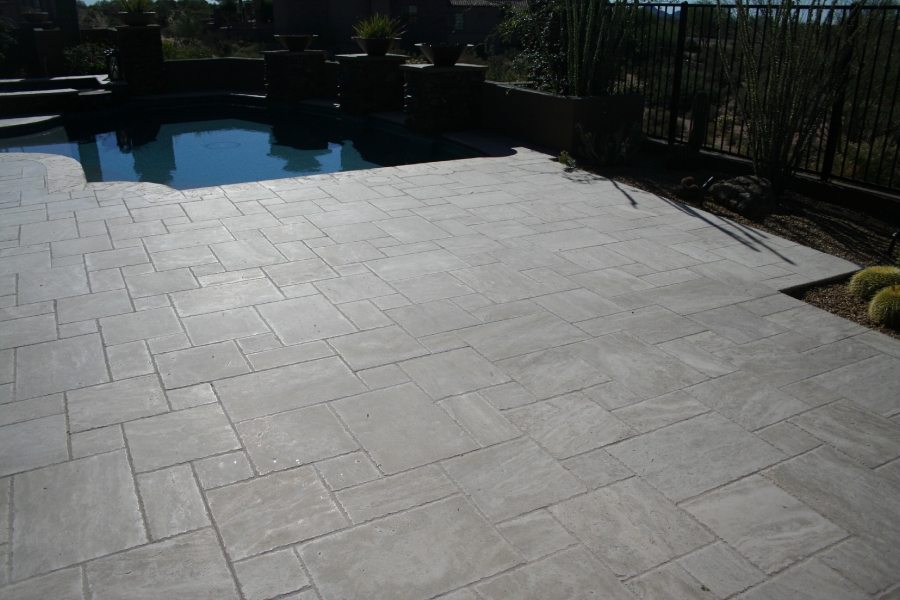

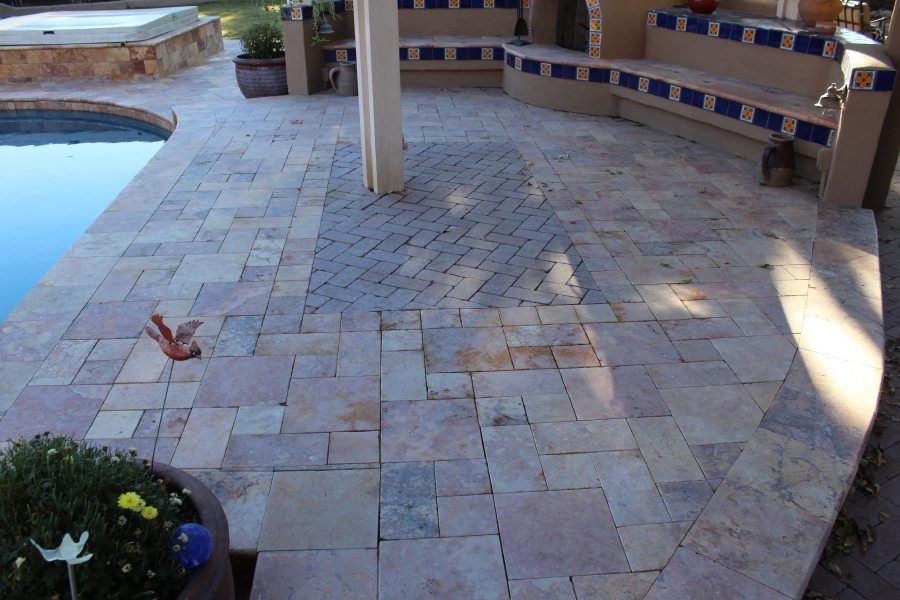
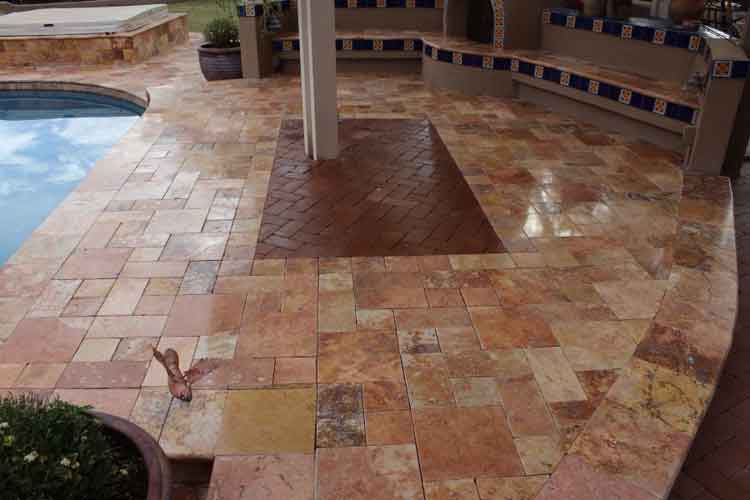
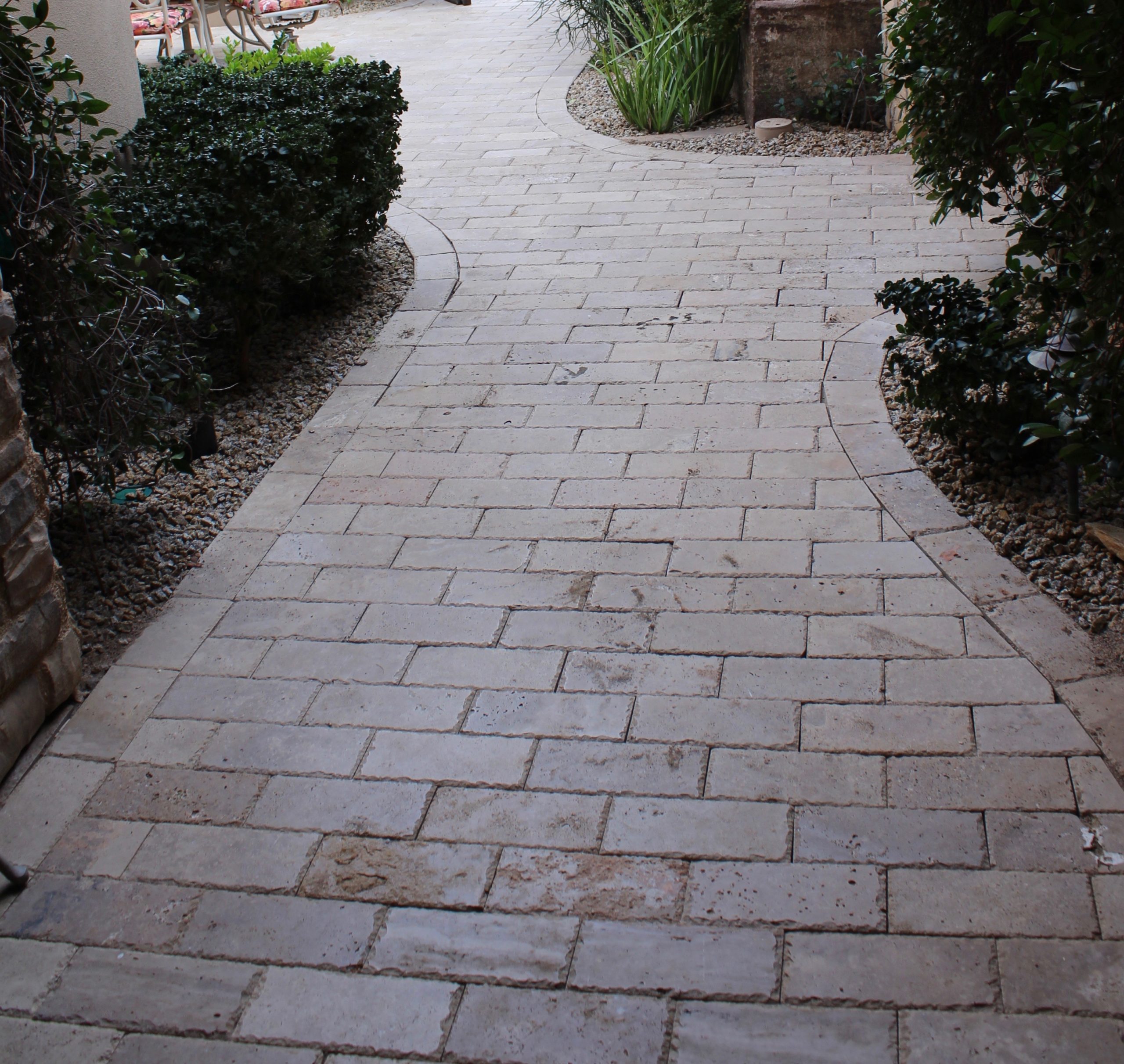
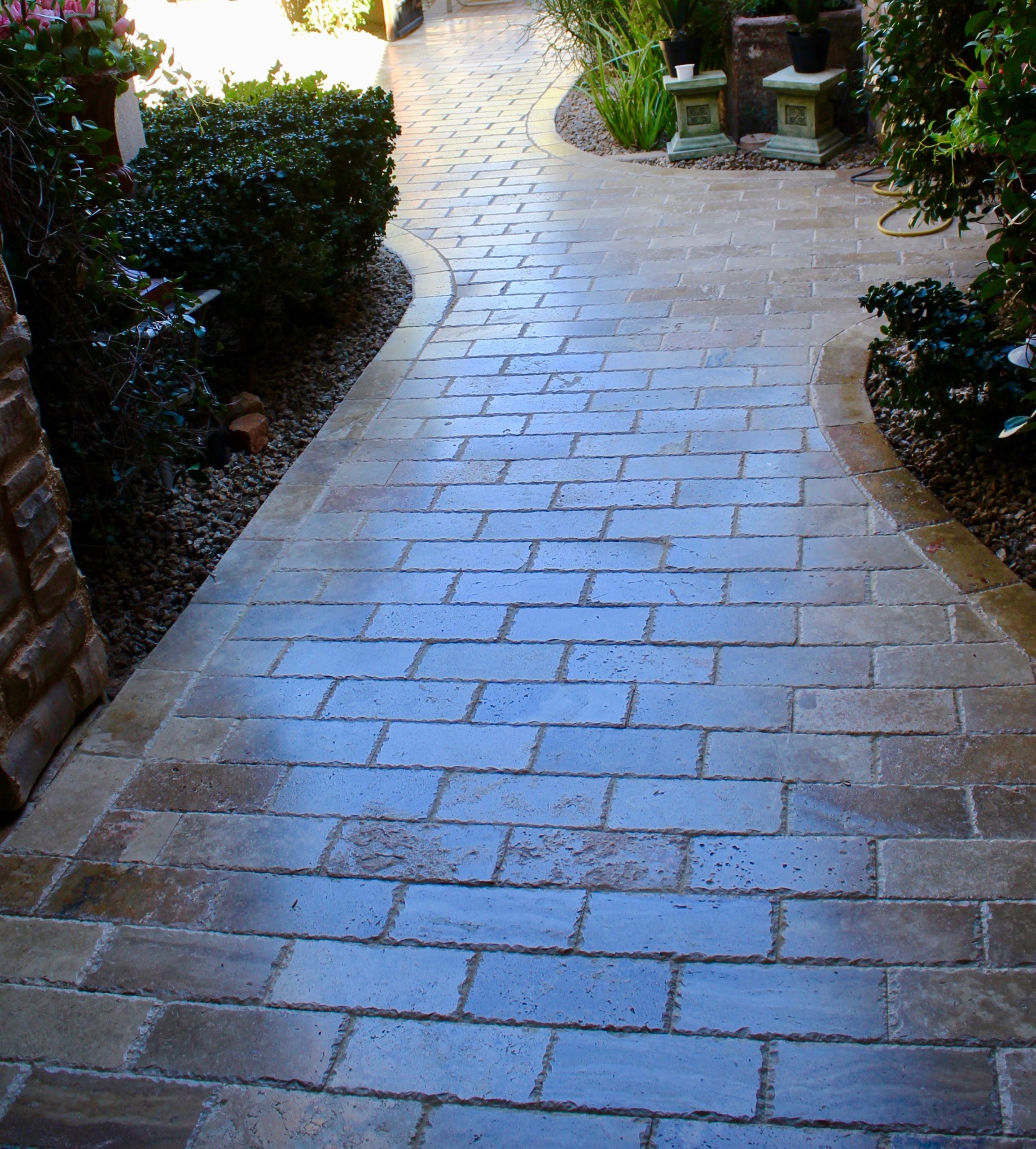
Don’t Let This Happen To Your Patio!
First we will address the surface (aka the finishing)
Our system is able to finish the stone without opening up air pockets underneath the surface. If you look at the surface of the travertine tile under a microscope it would look like a crystalline forest. All of these little trees are like straws that can provide millions of tiny pathways into the stone. We are actually sealing off the stone during the finishing process by reducing the surface area.
Less surface area means fewer pores. Our custom abrasive substance used to sand, scour, scrub, smooth or polish by removal of the original material. The amount of material removed is determined by the size of the abrasiveA substance used to sand, scour, scrub, smooth or polish by removal of the original material. The amount of material removed is determined by the size of the abrasive particles used (ie: grit) Sandpaper, scouring powders & steel wool are examples of abrasives. particles used (ie: grit) Sandpaper, scouring powders & steel wool are examples of abrasives. process starts this sealing process by closing off the pathways liquids have to get into the stone. As finishing progresses, the stone becomes more reflective. As a stone becomes more reflective it is being closed off by the reduction of surface area.
For almost 20 years, I have been inventing and constantly developing several different types custom abrasive processes. As of march 2018, we have actually been chosen by an abrasive fiber manufacturing company to test their new type of diamond abrasive process. We are proud of this and believe it shows our credibility in the industry to be chosen for such a task.
The calcium carbonate chemical formula is CaCO3. Comprised of one calcium atom, one carbon atom, and three oxygen atoms. When something, even water, breaks the bond between atoms, it releases the carbon and two oxygen atoms as carbon dioxide, leaving calcium oxide, or simple lime behind.
This simple lime {CaO} can be very corrosive when it gets wet (rain, pool water, sprinklers, fountains, dripper pots, etc) and is very destructive to the travertine, forming holes and breaking down solid stone into powder. The travertine paver itself, can be one of the primary sources for the calcium oxide but the are several other sources as well.
Simple lime can come from several sources. It is common to see it as efflorescence, a chalky white powder that builds up after water has evaporated. The efflorescence in a travertine patio can come from sources such as grass contacting the patio, planter boxes, etc. A big part of our service is having the experience to identify and address where the efflorescence is coming from and how to prevent future damage.
Every stone is unique in its chemical composition and the amount of lime already present before is installed. Some stones have almost zero lime and are less likely to breakdown especially if they are polished and sealed effectively, but some stones have a high content of lime from the beginning and they will break down rapidly. These stones are what would be referred to as the “bad apple.” They should be replaced whenever they are identified.
If these stones are able to stay in the patio they will break down and transfer lime to solid stones around them and start the negative chemical reaction.
Watch Tom explain the chemistry behind calcium carbonate’s transition into destructive calcium oxide in travertine patio pavers.
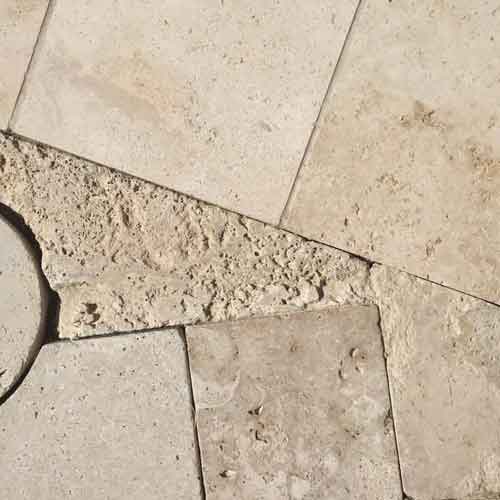
This patio was not very old and this brick is a perfect example of a bad apple. The lime in this bad apple has not transferred into the surrounding pavers YET!
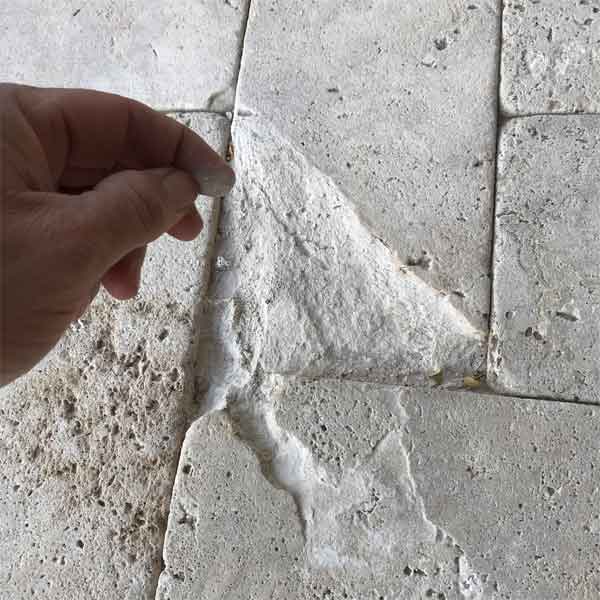
The corrosive lime is now transferring over the the travertine pool paver next to it.
These soak into the stone, and provide protection through water repellent technology. Invisible with no shine.
This family of sealers is known as penetrating sealers. They’re completely different than topcoat film former sealers. They have penetrants in them designed to penetrate as deep as possible carrying water repellent. They help fill up micro pores to slow absorption. They are not water proof or etch proof.
The best penetrating sealers are solvent-based natural look and even better solvent-based enhancing. Both of these types of sealers do not have what it takes to make a difference in the long term and are extremely expensive. A misleading issue with enhancing sealers is that if you use enough to actually enhance the stone it becomes a coatingAny sort of topcoat sealer, including enhancers that are overapplied, causing a buildup on the surface. More. Technically, any penetrating sealers should be applied and completely removed from the surface.
Our densifying sealer is a completely different type of chemistry and seals in a unique way. It is not a water repellent, it seals by occupying porosity and bonding to the molecules and making them more structurally sound and preventing them from breaking down into corrosive lime.
For the surface, our safe abrasive/sanding steps do much more for the appearance and health of the travertine than a penetrating sealer alone could ever do.
These sit on top of the stone, form a film or coating on the surface, do not penetrate, create a temporary shine.
There are local companies that guarantee the performance of their topcoat sealers. From one to five years, and some up to 20 years. This isn’t possible. Any coating on the surface of the travertine cannot perform because water will get in it one way or another. When it does the water is trapped underneath the coating causing damage as a liquid. Then it evaporates inside of the stone causing hydrostatic pressure and spalling.
If a stone finisher suggests a topcoat sealer for your patio, you should ask the important question, “Is this right for my travertine patio?” The short answer is no. By suggesting a topcoat sealer for a travertine patio, the stone finisher may be demonstrating a lack of knowledge of what works in this climate and how to treat travertine patios properly with the use of safe abrasive techniques and penetrating sealers. Secondly, these “shiny” topcoat sealers stay shiny for a few months in our Arizona sun before fading and turning a milky white or gray, then the flaking and peeling begins. More often, the travertine patio looks much worse than before it was coated. Coatings are difficult and expensive to remove.
Travertine pool patio pavers can be quite dense with very few holes or more commonly a lot of holes from small to very large.
On This side of the image, you will see a stone that has little to no holes. This type of travertine pool patio paver is dense enough that only the surface sealing process is needed.
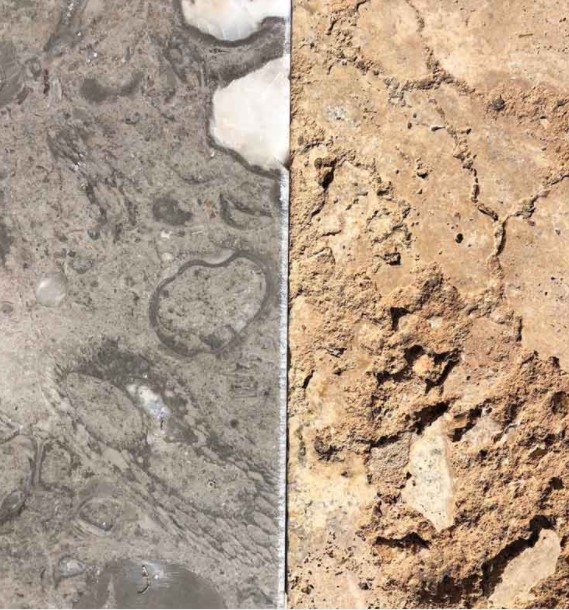
On This side of the photo, this travertine pool patio paver obviously has a lot of holes and porosity. The best way to address sub surface sealing is to soak our unique densifying sealer and then fill the holes with grout. It is common that polymeric sand is used, but the problem with polymeric sand is that is very porous and wicks the water into the stone.
Both of these stones are new and it is impossible to identify the amount of corrosive lime they have in them until they start to breakdown. That is why it is always better to do a complete surface finishing process and sub surface sealing and filling process when the patio is first installed.
Filling the holes isn’t always the customers choice, some of the reasons are:
If the decision to not fill the holes is made then we suggest soaking our densifying sealer in, finishing the surface and then applying solvent-based enhancing penetrating sealer for water repellency.


Baker’s Travertine Power Clean has proudly been in business since 1988. Starting out in carpet cleaning, we evolved into tile cleaning/repair and then transitioned into Travertine and natural stone finishing. Not satisfied with the standard and available products and tools to finish marble and almost nothing available specifically for Travertine, we researched and developed our own unique abrasive system. Our system and powerful quality equipment provides great results in sometimes less than half the time than our top competitors.
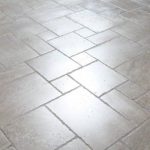
In Business Since 1988 With
Millions of Square Feet of Happy Customers
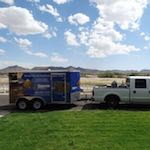
Bakers have always and will always make sure you’re 100% satisfied in their work. Guaranteed.

Mentioned by Name in Over 400 Positive Reviews, Our Employees are the Best Equipped & Experienced in the World.
We Were Stunned At How Beautiful Our Tile Looked After Baker’s Finished!!! Unbelievable!! And The Team That Came To Our House Was, Hands Down, The Best! We Will Use Them Exclusively For This Service. They Also Cleaned Our Tile In The Shower, The Bathroom Vanities (His And Hers) And The Jacuzzi Tub Deck! They Are Fantastic! There Are Not Adequate Words To Describe What A Great Service They Performed!! Thank You Baker’s!!!!

SHARON C.
Travertine Semi-Gloss – Scottsdale, AZ
I Was Very Concerned To Have A Large Flagstone Patio Refinished But Could Not Be Happier With The Job, My Flagstone Was 20 Years Old In Bad Condition And Now Looks Like New. Work Crew Was Very Courteous And Gladly Answered Any Of My Questions Or Concerns. There Were Numerous Pots And Plants On The Patio Which They Moved Off Without Any Damage. Better Still, They Put Them All Back Where They Were Before. I Would Definitely Recommend This Company Without Hesitation And Will Use Them Again.
 DIXI R.
DIXI R.
Flagstone Cleaning & Refinishing – Scottsdale, AZ
Baker’s Slate Power Clean Sealed My Slate Floors When They Were New And Have Maintained Them For Several Years. The Slate Floors Are In Extreme Traffic Areas But Have Preformed Excellent Because Of The Original Sealing Process From The Beginning.I Am So Happy That I Found Such A Specialized Company That Was Able To Handle This Ongoing Project.
 The Venue Of Scottsdale
The Venue Of Scottsdale
Slate Cleaning & Sealing – Scottsdale, AZ